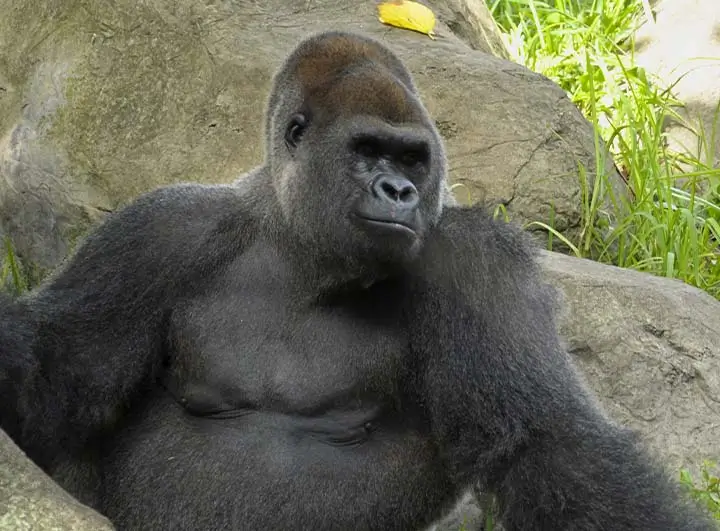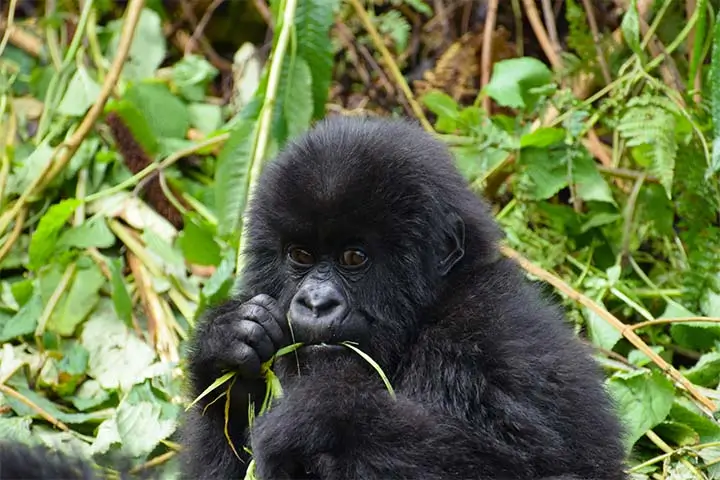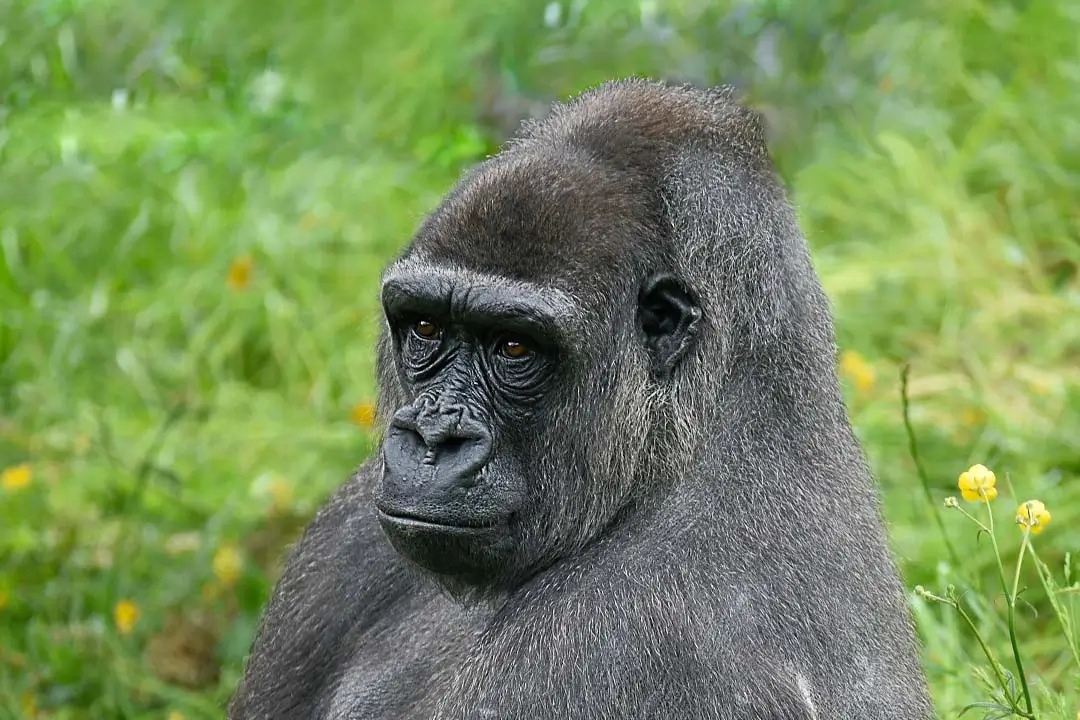Mountain gorillas evolved with the rise of the volcanoes half a million years ago, adapting to the terrain by becoming larger than western gorillas and with thicker, and darker fur. They are herbivores who sometimes eat ants and termites. Only about 1,000 mountain gorillas exist in the world but thankfully the number is increasing. They can be visited in four parks: Rwanda's Volcanoes National Park, Uganda's Bwindi and Mgahinga National Parks and Congo's Virunga National Park. Eastern lowland gorillas also known as Grauer's are even bigger than mountain gorillas.
Today there are estimated to be 3,800 of them; Congo's Kahuzi-Biega National Park is the only place where they are habituated. Golden monkeys share the same environment and are also endangered but are much less researched. They spend much of their time in the bamboo zone eating bamboo shoots. You can see them in Mgahinga, Volcanoes and National Parks. Also present in the area: elephants, buffalos, chimps, baboons, blue and red-tailed monkeys, zorillas (skunk-like creatures), otters and many other animals
Gorilla families are led by a dominant male, occasionally supported by a second and third male, known as the silverback/s. The name comes from the fact that around the age of thirteen the hair along a male's back turns silver or grey. A silverback will have a harem of several females all of whom carry his young ones. Silverbacks are known to kill infants not fathered by them-selves so that the mother comes into oestrus more quickly. The silverback's chief role is to protect his family, also decides when, where and how fast they move camp, pacing the day's travel to accommodate the young, sick or injured. Silverbacks are especially gentle towards their own infants. Female gorillas reach sexual maturity at around eight years. Habitually the silverback in their group is their father so to avoid inbreeding females will leave the group they were born into. They will transfer to another established group or link up with a lone silverback who is establishing his family.
Gorilla reproduction is slow. The interval between infants is four years (hence the incentive of silverbacks to commit infanticide on young that are not their own) and infant mortality is high. In her lifetime a mother will raise between two and six offspring remaining fertile till the end of her life. Infants are generally born at night after a gestation period of eight and a half months. For the first three months infants are completely dependent upon their mothers. At three months, they begin to walk and climb on and around their mother. During the first six months baby gorillas develop about twice as fast as humans. Weaning takes place at 3 and half months and as they grow, play takes on an increasing significance. Over the next few years, social play reflect the roles that each will assume as an adult.
Gorilla Habituation
Gorilla Habituation is the process of introducing humans and takes months to 2 years or more. It's a question of establishing trust and the same guide will return to a gorilla family day after day, each day trying to get closer and closer, until his presence is accepted. The next step is for unfamiliar humans to escort the guide. This continues until the guide is tolerated to visit and to bring complete strangers (tourists).
Gorilla trekking
Treks to visit the mountain gorillas are well organized and responsibly guided in both Uganda and Rwanda. Visitor numbers are limited to eight persons per gorilla family per day. Eight gorilla families in Rwanda and four in Uganda are habituated meaning there are about 8 x 12 = 96 permits available each day. That's a significant sum but the inspiring fact is that this income stream works and mountain gorilla numbers have grown over the years. Treks start early (8am) and can last between 30 minutes and several hours before contact is made with the family. Bear in mind that the average altitude is 2,500m so physical effort is tougher. The guides are English speaking and have amazing relationships with their family of gorillas. There is no doubt that there is personal recognition and trust between the guide and the silverback which is a humbling spectacle to observe.
Before you set off to track gorillas you are briefed about gorilla etiquette and the dos and don'ts of the trek. It's all obvious stuff, but the first time you encounter a silverback, which can weigh in at over 200 Kg it's a little unnerving. The key rule is not to maintain direct eye contact, which is interpreted as a challenge. Time spent with a family is a about one hour and the family generally continues to browse and feed in the normal way. The youngsters are usually pretty confident and may well approach you, in which case you need to move away. Another of the rules that you will be told about is that you must maintain a “barrier distance” of 7 metres between you and a gorilla to prevent any human diseases being passed to the gorilla family.
Gorillas in the Democratic Republic of the Congo are one of the wildlife species that have put Congo on the map being known for the gorilla trekking activity that many travelers fancy across the world. The Democratic Republic of Congo is lucky to be one of the 3 countries with endangered mountain gorilla species. Gorillas are natives to Africa and according to World Wildlife Federation (WWF); gorillas are the world's largest primate. Mountain Gorillas are fewer than 1000 and are spread between the Democratic Republic of the Congo, Rwanda and Uganda. The Virunga National Park receives on average 500 tourists trekking the mountain gorillas.
Do You have any Questions?
Our Experts are ready to provide answers
Travel With Us
When considering your next adventure, Papyrus Adventures stands out as the ideal travel companion, offering a comprehensive package of benefits that ensure an unparalleled experience.
Best Price Guaranteed
With our "Best Price Guaranteed" policy, you can rest assured that you are getting the most value for your investment.
Professional Safari Guides
Our commitment to excellence extends to our team of "Professional Safari Guides," who possess extensive knowledge and expertise, ensuring a journey filled with insightful and unforgettable moments.
Locally Owned Company
Papyrus Adventures is deeply rooted in the destinations we explore, allowing us to provide authentic and immersive experiences that showcase the rich cultures and landscapes of each location.
24-7 Customer Support
our "24-7 Customer Support" ensures that your needs are met around the clock, providing peace of mind and a safety net for any unforeseen circumstances.



